Podcast Transcript
Intro: You’re listening to the Ordinary Vegan podcast, where we teach you everything you need to know about adopting a plant-based diet full or part time. Our goal is to empower you to live a long and healthy life.
You can find today’s show at ordinaryvegan.net or on iTunes. If you have any questions, please send an email to questions@ordinaryvegan.net.
Nancy: Hello friends and welcome to Ordinary Vegan. My name is Nancy Montuori. And this is my new labor of love and my very first podcast, so go easy on me.
I’ve been on a vegan diet for close to five years. My journey began when I went to see a documentary movie called Forks Over Knives. When the movie ended, I left the movie theater so pissed off, because I thought I was eating a healthy diet and found out from that movie, not true. So, from that day on, I decided that I was not going to eat meat and dairy again in my lifetime.
In a very short period, I was able to discontinue my statin medication for high cholesterol, and my energy level was at an all-time high. Those were just a couple of the immediate health benefits. Becoming vegan was a big decision, and to hold myself accountable, I started writing a vegan food blog called Ordinary Vegan.
I wrote it strictly for me to document my own progress. But the more I learned about the connection between food and disease, the more passionate I became. I wanted to yell from the rooftops, “You don’t have to be sick. You can just change your diet.” Today, my goal is to serve you, encourage you, educate you, and support you every step of the way. And most importantly, make your transition to a plant-based diet as easy and as fun as possible. I take the responsibility of this podcast very seriously and hope all of you can learn from my mistakes.
In 2013, I became certified in plant-based nutrition from Cornell University. I am also a plant-based chef and can’t wait to share my recipes with you. I believe becoming vegan isn’t just about food. It’s also about reaching your highest spiritual capacity. I also believe in serendipity.
The day I went to see Forks Over Knives, I was at one of the lowest points in my life. I knew my 25-year-plus marriage was coming to an end, and I had absolutely no control over it. That day, I felt like someone was holding my head underwater, and I couldn’t breathe. So, I decided to go to the movies to escape.
I chose Forks Over Knives randomly. I had never heard of the documentary. But when I left that movie theater, I thought maybe I couldn’t control what I thought was as hopeless situation at the time, but at least I could have control over my health and wellness. Well, that’s how it all started, but not how it ended. Becoming plant-based changed my life and it can change yours. More on that in my next podcast. Today is all about getting started on a plant-based diet, and it’s not as hard as you think. First, let’s discuss what is the vegan diet, also referred to as a plant-based diet.
A plant-based diet is centered on whole, unrefined, or minimally refined plants. It’s a diet based on fruits, vegetables, whole grains, legumes, and healthy fats. It excludes all meat, dairy, and eggs. Most vegans also avoid honey and refined sugar. Most people don’t know this, but bone char is used to make refined sugar white. So why should you consider a plant-based diet? The short answer is, do you want to live a long disease-free life?
There is a convergence of evidence that a plant-based diet can help prevent and even reverse some of the leading causes of death, including cancer, heart disease, type 2 diabetes, and obesity to name just a few. If you’re worried about heart disease because it runs in your family, people on a plant-based diet reduce their risk of heart disease by 32%. So, don’t use your genetics as an excuse. Think of genetics as seeds. If you don’t water the seeds, the grass won’t grow.
In addition to diminishing your chances of contacting a life-threatening disease, a plant-based diet will naturally help with weight loss. Just think, you may never have to diet again. You also have more energy and less stress.
Other reasons to embrace a plant-based diet include animal welfare. We can’t ever be a peaceful and compassionate society if we allow cruel and inhumane treatment towards the animals. Before I became vegan, I never thought about the impact my diet had on animals. I knew I had a strong visceral reaction to animals being killed, but somehow it didn’t translate to my plate of food.
Well, that’s all changed.
All animals, no matter what species, have a right to live a life free from pain and suffering at the hands of humans. Unfortunately, in the profit-driven world of factory farms, animals are no longer viewed as living feeling beings.
A smart guy named Albert Einstein once said, “Our task must be to free ourselves by widening our circle of compassion to embrace all living creatures in the whole of nature and its beauty.”
Animal agriculture has also become a threat to our environment. And climate experts have concluded that human-caused climate change is occurring, and it’s responsible for global warming. And things aren’t looking up. Research warns that without radical changes to our diets, the food industry alone is likely to cause an 80% increase in greenhouse gas emissions by 2050.
Greenhouse gas emissions cause a man-made greenhouse effect that traps us inside and changes the temperature of the earth’s surface. The world’s top scientists, including Stephen Hawking, considered climate change to be one of the world’s biggest threats and eating plant based, even two or three days a week, can help save precious resources.
Last but not least, food safety should be a major concern for everyone. On October 26, 2015, the World Health Organization made a major announcement. After years of research, they found that eight ounces of processed meat a day could raise the risk of colon cancer by a whopping 18%.
To put that into perspective, eight ounces of processed meat a day equals about two slices of ham or turkey. If you’re not sure what processed meat is, it is any meat that has been salted, cured, fermented, or smoked. That includes most hotdogs, lunch meat, traditional bacon, and meats in a casing such as sausage.
But meat is just the tip of the food safety iceberg. Many esteemed scientists are very concerned about the connection between glyphosate and disease. The World Health Organization issued a warning about glyphosate’s possible links to cancer. Many European and Latin American countries now ban glyphosate.
What is glyphosate? Glyphosate is an herbicide used to kill weeds. Monsanto brought it to the market in the 1970s under the tradename, Roundup. Farmers use glyphosate to kill weeds without killing their crops. Glyphosate can be hidden in many foods including wheat, milk, canola oil, corn syrup, and soy. Monsanto, creator of the herbicide, demanded that the World Health Organization retract the cancer report, but they refused. Now, additional studies are discovering links between the increase in gut and gluten disorders to glyphosate.
So, why is glyphosate toxic to our health? Glyphosate works as an antibiotic that kills good bacteria in the gut and this allows pathogens to overgrow and cause disease. It also interferes with essential minerals like iron and manganese. We depend on the mineral manganese to alleviate anxiety. Glyphosate also depletes serotonin. Serotonin plays a key role in bowel function, gut health, and of course, our mood.
Glyphosate can also be found in all nonorganic, genetically modified foods, also known as GMOs.
Monsanto created the GMO seeds, used to grow GMO food specifically to withstand glyphosate. Not to feed the world like some people think. When it comes to solving world hunger, GMOs are a dangerous step in the wrong direction.
Another cause of concern is dairy. Research has linked casein to cancer. Casein is the main protein in cow’s milk and in most mammals’ milk. Casein is also added to processed foods as an addictive flavor enhancer. Casein is often referred to as the nicotine of fast food. Biochemist and author of The China Study, Dr. T. Colin Campbell, called casein the most relevant cancer promoter found in the last 50 years. I want to repeat that because this is so important. Dr. Campbell called casein the most relevant cancer promoter found in the last 50 years. Casein is not healthy for anyone, don’t be fooled by the milk advertisements. You don’t need cow’s milk for healthy bones and calcium. And you will learn more about that in my upcoming podcasts.
So, I know this has a lot to take in and nutrition and food safety are confusing subjects. I’m sure some of you are asking, “If all this is true, how come I didn’t know about it?” Or, “Why isn’t the FDA looking out for us in the United States?”
Well, the agribusiness, which includes meat producers and dairy farmers, donate over $90 million a year to political campaigns. That number keeps increasing every year because the public is pushing back on antibiotic use and inhumane treatment of animals. The agribusiness is worried, and they know they can buy off the politicians, but we can vote with our fork.
So, now that we know the why, here is the how you get started on a plant-based diet.
Find the strategy that works for you. If you feel that quitting all animal protein at once works, then do it. If you need more time to adjust to a vegan diet, just take it slowly and start eliminating non-vegan items from your diet. Make the changes you feel comfortable with at your own pace. Keep it simple. Think about every meal divided into four: One-fourth are grains, one-fourth are vegetables, one-fourth are legumes, and one fourth are fruits. Then, include a small side plate of healthy fats, like nuts, seeds, and avocado. I call this the plant-based power plate.
Stay away from processed food, even if you think they’re vegan. They’re hidden animal ingredients in thousands of processed foods. My rule is read labels and if you don’t know what it is, don’t eat it.
One of the most popular myths about a vegan diet is that you won’t get enough protein. If you eat a well-balanced vegan diet that includes grains, legumes, vegetables, fruits, and healthy fats, you never have to worry about protein. The best food you can eat is the food you cook for yourself. My advice is to set some time aside during the week to make some vegan go-to options. These prepared foods come in handy when you come home late from work or school, and cooked grains soups, muffins last quite a few days in the refrigerator.
Many people say being vegan is expensive, but your health is the most precious commodity you have. If you shop wisely, being vegan should not be expensive. Buy fruits and vegetables in season to save money and to get the best selection. Buy grains, legumes, nuts, seeds in bulk to save money. There are also many new online healthy markets that operate like a Costco and make healthy food affordable. Try to network with other vegans through blogs, websites, and vegan meetups. You can find likeminded people online no matter where you live. Ordinary Vegan has over 230,000 community members on Facebook, and I learn something new from them every day. Please join us at Facebook/OrdinaryVegan.
Last but not least, the key to kicking meat and dairy is giving yourself enough time to feel the extraordinary changes that will take place in your mind, in your body.
Now, let’s talk about getting started in the kitchen.
The first question most people ask is, “What do I eat?” I like to take this instead of that approach. What I have discovered over the years is it’s more about the flavors you crave than the protein you use. For example, any animal protein that you eat can be replaced with plant-based ingredients, including burgers, meatballs, stews. These can be made with seitan, tofu, tempeh, jackfruit, mushrooms, lentils, beans, nuts, and legumes. There are also meat substitutes from companies like Field Roast and Beyond Meat. They make meat crumbles, chicken, sausage. Basically, any meat you desire is available made from plant protein.
Instead of milk, drink non-dairy milks, like almonds, rice, coconut, hemp, or soy milk. Instead of butter, there are lots of vegan butter options and they are delicious. You can find vegan butter options in most mainstream grocery stores.
Instead of cheese, everybody says I couldn’t be vegan because I would miss cheese so much. There are a slew of vegan cheeses hitting the market. We even have a vegan cheese store here in LA. I prefer the nut cheeses over the palm oil cheese for various reasons. And please remember just because a cheese is vegan, doesn’t always mean it’s healthy. So, I wouldn’t overdo the oil-based vegan cheeses.
I recommend making your own nut-based cheese which is simple and delicious. And you can find recipes for nut cheeses on my website, ordinaryvegan.net. Instead of eggs, use a vegan egg replacement. I personally like flax eggs as an egg replacement, especially as an emulsifier. It’s simple to make. Whisk one tablespoon of ground flax seeds with three tablespoons of water and put it in the refrigerator for 10 minutes to thicken. That equals one egg. If you’re doing some serious baking, I like to use Bob’s Red Mill Egg Replacer. There is also a brand called the Vegg for yolk replacement that works quite well. Instead of egg-based condiments, there are numerous varieties of vegan mayonnaise, cream cheese, and sour cream. Instead of yogurt, buy soy, almond, or coconut yogurt and make sure they don’t contain casein.
Now let’s talk about what to stock up on.
Vegetables. Any and all vegetables, eat as many vegetables as you like. Fruit, any and all, fresh organic fruits. Whole grains, like brown rice, quinoa, farro, barley. Make a batch and add it to salad, soups, and stir-fries during the week.
Beans. Chickpeas, lentils, black beans, cannellini beans, kidney beans. You can buy in bulk to save money or buy pre-cooked in cartons for quick high protein meals.
Nuts and seeds are delicious and nutrient dense and a little goes a long way. I recommend buying a bag of brown flax seeds, chia seeds, and hemp seeds. Use a tablespoon of one or two of those a day. They are the perfect blend of plant-based omega-3 and omega-6, so much better than fish oil.
I like flavor enhancers for the cupboard, like sun-dried tomatoes, roasted red peppers in a jar. Kitchen-ready ground tomatoes, a low-sodium soy, gluten-free Tamari, dried basil and oregano, onions, lemons, parsley, ground chipotle, ginger, nutritional yeast, oats, and rice vinegar.
Some of my favorite vegan snacks are steamed edamame, popcorn sprinkled with nutritional yeast for a cheesy flavor, dates stuffed with cashew cream, sliced avocado sandwich with lemon juice, radishes, and a pinch of salt, baked sweet potato drizzled with maple syrup, pita chips with salsa or hummus, frozen mango or frozen bananas, apples smeared with peanut butter and oats. Those are just a few of my favorites.
If you have a sweet tooth, there are many dairy-free ice cream options and vegan dark chocolate bars, and lots of vegan bakeries popping up all around the world. All this information is laid out on my website ordinaryvegan.net, under Vegan Shopping List.
Before I go, I want to share one of Ordinary Vegan’s most popular plant-based recipes. It’s called Garbanzo Bean Soup with tomatoes and pasta. This is a great go-to meal. Prepare it on a Sunday and enjoy it all week.
The best thing about this recipe is that it took me two 20 minutes start to finish, and here’s what you need:
Two 15-ounce cartons of low-salt garbanzo beans drained and minced
Three to five cups of vegetable stock plus a quarter cup for sautéing
One cup of orzo or any small pasta
One 28-ounce carton of low-salt diced tomatoes or crushed tomatoes
Four garlic cloves, chopped
Three shallots, chopped
Two teaspoons of fresh chopped rosemary or one teaspoon of dried rosemary
One teaspoon of fresh chop thyme or half a teaspoon of dried thyme
One teaspoon of dried basil
One teaspoon of salt
A quarter teaspoon of red pepper flakes, which is optional just to add a little heat
Fresh ground black pepper
In a large soup pot, heat the quarter cup of the vegetable broth, add the shallots and garlic, and sauté about two to three minutes or until it’s soft. If it’s sticking, add a little bit more broth, there is no reason to use oil in this recipe. Hm, I can smell those shallots and garlic sizzling.
Add the seasoning, garbanzo beans, tomatoes, orzo, and vegetable stock. I like to start with three cups of veggie broth and add more broth if needed depending on how much liquid you like in your soup. Remember, the pasta will absorb some of that broth. Cook until the orzo is al dente, approximately 10 minutes or so, taste, and adjust the seasonings. Ladle the soup into the bowls and serve with crunchy bread and something green.
It is delicious. I promise you’ll love it.
The last thing I want to mention is that health and wellness isn’t a destination, but an ongoing relationship with you and your body. Becoming vegan changed my life. I am kinder. I’ve become empowered. I faced my fears. I transformed. I healed. And it all started with a plant-based diet. I hope you have that same experience.
That is it for my first podcast. Yay! Thank you so much for joining me. I would love to hear your feedback, so please send me an email at questions@ordinaryvegan.net. You can find me and all my podcasts online at ordinaryvegan.net and on iTunes. If you get a minute, please write a review on iTunes because the more reviews the podcast gets, the more prominently it will be featured in iTunes, which means reaching more people with our plant-based message. I will also post an iTunes link in this week’s show notes located at ordinaryvegan.net/1, as in my first podcast.
Thanks for joining our plant-based community today. Together, we can accomplish great things. Please subscribe so you don’t miss any of Ordinary Vegan’s recipes and plant-based tips. If you have any questions or feedback, please don’t hesitate to reach out to me. And I would like to end this by thanking composer Kevin MacPherson for the fabulous music. And a thank you to Doug Barnes for the great sound. Till next time.
Outro: Thanks for joining our plant-based community today. Together, we can accomplish great things. Please subscribe so you don’t miss any of Ordinary Vegan’s recipes and plant-based tips. If you have any questions or feedback, email us at questions@ordinaryvegan.net. Until next time.

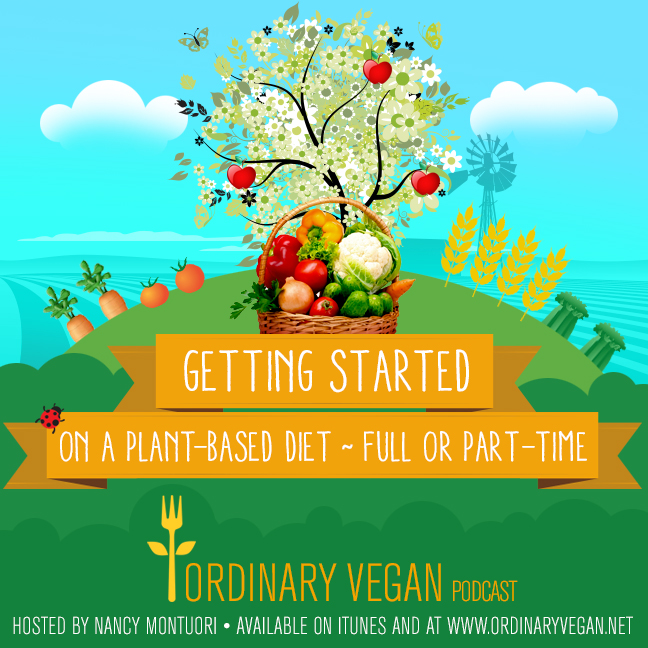

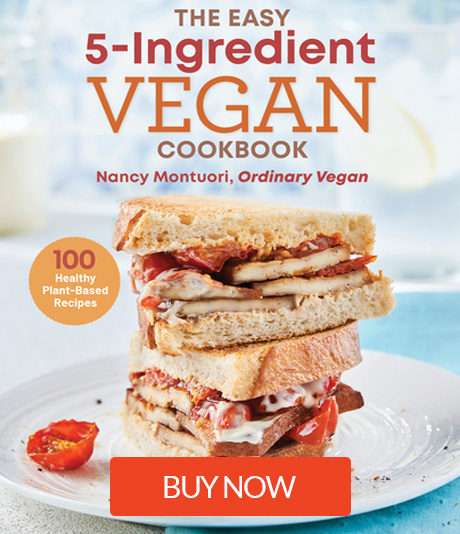
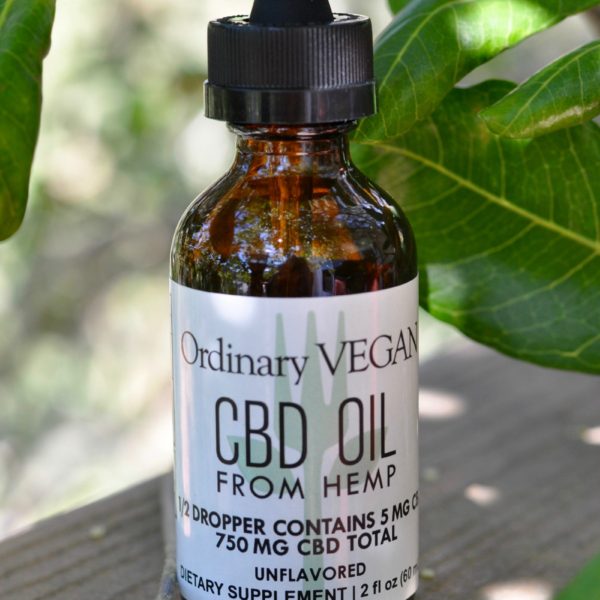
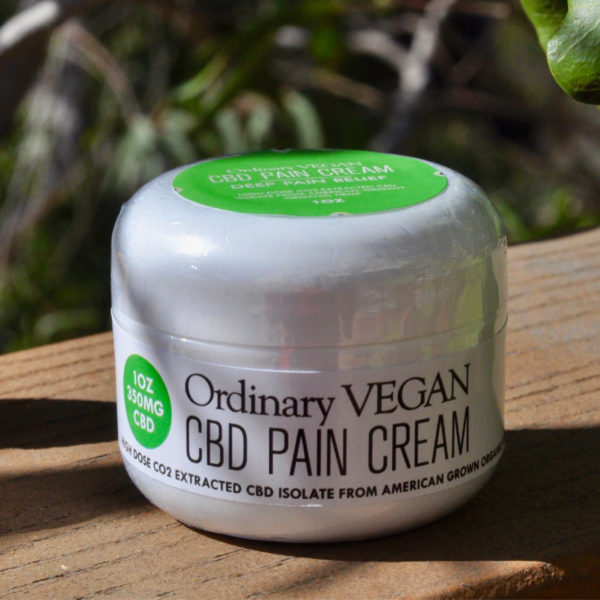
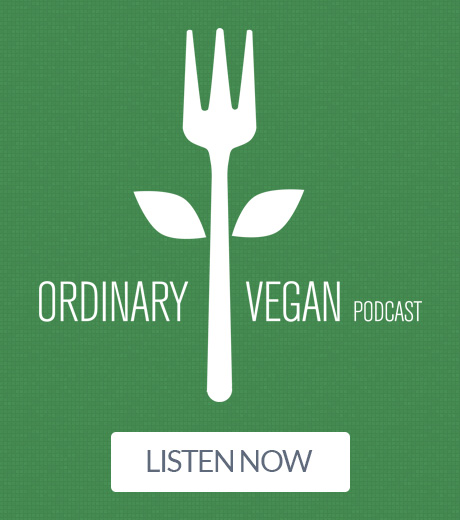
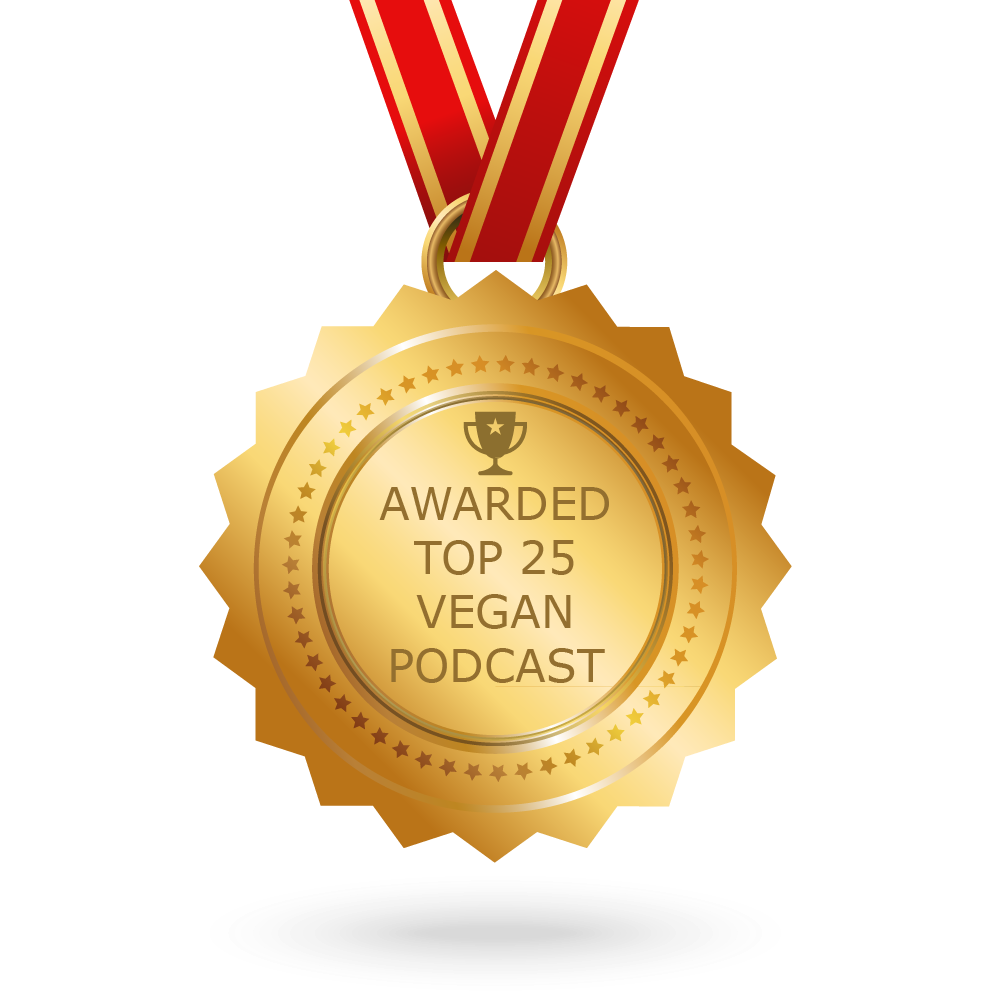

Good morning Nancy,
I am new to vegan world. My father recently adopted a vegan lifestyle to help reverse heart disease and his progress is nothing short of miraculous. He looks and feels better than ever and his blood work is confirming tremendous progress. I am taking this journey with him. My wife and I recently adopted three amazing children and I am determined to give them the best nutrition possible. Luckily, they already prefer healthy foods over processed junk. My youngest son is five years old and he recently announced that he will never again eat an animal. He has decided to take the vegan path with my father and I. Thank you so much for the work you are doing. Your passion for health shines through in your podcast and I look forward to hearing more. Your story is inspiring and encouraging.
Thank you!
Amber
Hi Amber – Thank you so much for sharing your story and for your kind words. Your journey brought tears to my eyes. To think of all the trickle down affect you and your dad are having on people is what it is all about – spreading the plant-based message and sharing the gift of health and wellness. Also, I have 8 adopted nieces and nephews and that was one of the was one of the greatest gifts our family ever received. Most of them are grown up now and one of them is also in the adoption process. Thanks again for taking the time out of your busy life to share. Sending you lots of love and compassion!
Nancy
Hi there, thank you so much for this. I am a total beginner and feel a little overwhelmed but totally excited at the same time. It’s a true life-changing experience and I’m yearning for that xx
Hi Tanya and welcome! And congratulations on adding more plants to your lifestyle. Remember keep it simple so you don’t get overwhelmed. A nice clean plate of food that includes a legume, a grain, vegetables topped with some salsa or a little soy sauce. Have a side of fruit with that. Make sure you are including some healthy fats like 2 tablespoons of hemp seeds or chia seeds a day. You can toss the hemp on top of salads, in your morning oatmeal or in soups. You can make a chia gel with the seeds by just adding some water to the seeds. Add that to a smoothie. Last but not least, remember you don’t have to be perfect. Good luck and keep me updated! Nancy